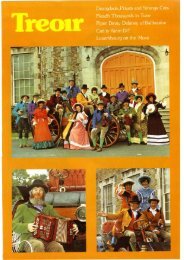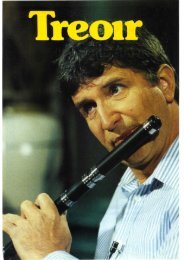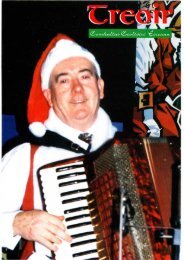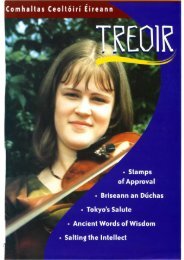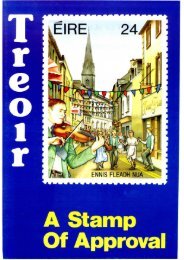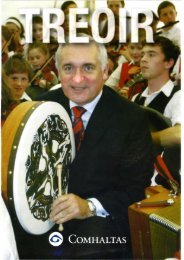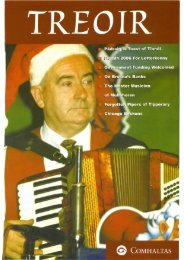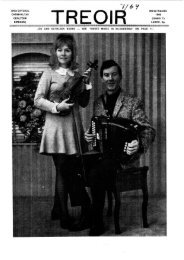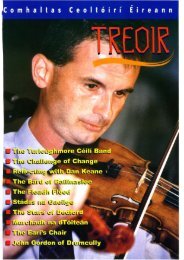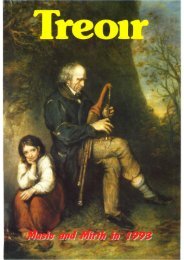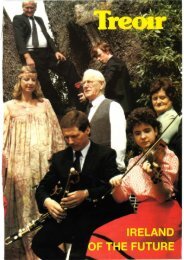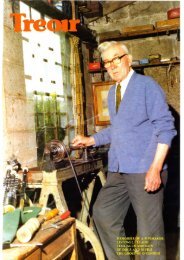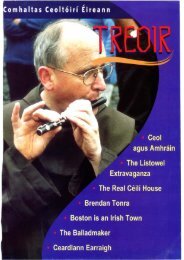You also want an ePaper? Increase the reach of your titles
YUMPU automatically turns print PDFs into web optimized ePapers that Google loves.
Arts Rethink In Australia<br />
This major change in policy occurred<br />
after the first Hawke government was<br />
ele cted . It became known that Mr.<br />
Barry Cohen, the Minister for Environment<br />
and Culture was interested in folk<br />
music and so as Phyl says, "They just<br />
approached the Minister and said ,<br />
What about some more funds?' The<br />
Minister said , 'I can't give you more<br />
funds, the only thing I can do is try to<br />
see that a folk person is appointed to<br />
one of the Boards.' "<br />
And so Phyl Lobi became a member<br />
of the Music Board. " It was a bit of a<br />
shock to their systems. I don't think<br />
they would have thought of appointing<br />
a folk person."<br />
The Board consists of a musicologist<br />
specialising in French 18th Century<br />
music, an opera singer, a representative<br />
of the Youth Orchestra, a violin teacher,<br />
a jazz singer and a composer. Most of<br />
them knew little about folk music.<br />
"They would have thought of it as amateur<br />
music." Phyl had to answer such<br />
questions as, Why is punk music not<br />
folk music? Why is rock music not<br />
called the folk music of today? What is<br />
Australian about the music? "These<br />
questions showed that no , they didn't<br />
think . we had a folk culture , especially<br />
not a folk music culture."<br />
One of her initial jobs on the Board<br />
was to answer all these questions and<br />
Phyl did this in her Folk Paper, a one<br />
hour long presentation which included<br />
so ng s entitled " Folk Culture in<br />
Australia" . It is a definite look at which<br />
is folk culture, its role in Australia and<br />
its future .<br />
The M usic Board members were " all<br />
taken aback - they were expecting a five<br />
minute paper on what folk music was<br />
about. It changed their minds but not<br />
entirely enough to recognise that it was<br />
their place to fund it to the extent that<br />
it deserved to be funded . But it<br />
changed their minds to whether such a<br />
folk culture existed."<br />
28<br />
THESE EXTRACTS FROM AN ARTICLE IN THE AUSTRALIAN FOLK<br />
MAGAZINE "STRINGYBACK & GREENHIDE" ARE PUBLISHED WITHOUT<br />
COMMENT. NONE IS NECESSARY!<br />
The Australia Council was formed in the heady innovative days of the Whitlam<br />
government. Its aim was to stimulate Australian culture and help remove the cultural<br />
cringe. However , recognition for Australian folk music was slow coming.<br />
Even as late as 1982-3 out of the Music Board's allocation of $9 .5 million, folk<br />
music received only $10,000. Now, in 1985 things have changed. Phyl Lobi, folk<br />
singer, song writer and educator is now a member of the Music Board and at last the<br />
funding bodies are aware of the importance of the folk arts and prepared to fund<br />
their survival and development.<br />
NOEL HILL selects a tape from the<br />
<strong>Comhaltas</strong> archives.<br />
" And to a certain extent they were<br />
right. It isn't just music. You can' t<br />
take the music away from the poetry.<br />
So , you need funding across all parts (of<br />
the Australia Council.) A Folk Arts<br />
Board is needed."<br />
COMMUNITY MUSICIANS<br />
On her fifteen months on the Board ,<br />
Phyl has become aware of problems<br />
facing folk music and its personalities.<br />
For a start the Board likes to assess<br />
the talents of the individuals it assists<br />
and" .. . the talent of a folk musician is<br />
not concentrated in the same area as an<br />
art musician . The perception of material<br />
is far more important in a folk music·<br />
ian's talent than is the ability to sing or<br />
to play. It is the ability to perceive<br />
w hat is relevant to the fo lk culture , a<br />
skill which takes a long time , and we all<br />
still make mistakes in what we choose<br />
to do , where and when we choose to do<br />
it. It's apparent that where we ought to<br />
be is no t where we are at the mo ment.<br />
"The only way to get where we want<br />
to be is to get the funding to do it. The<br />
places that need folk musicians aren't<br />
where they ex ist. Places like Tertiary<br />
Institutions, and conservatoriums- training<br />
people who will become musicians<br />
in the community. They are totally unaware<br />
of folk music and they are going<br />
out sometimes, into communities that<br />
are rich (in folklore) ... . and they are not<br />
utilising those skills and experiences. In<br />
places they are introducing music that<br />
could submerge and drown the beginnings<br />
of a revival of folk culture."<br />
An area of conflict is the broad<br />
policy to develop a multicultural<br />
society. "The A ustralia Council says,<br />
'Yes, we want to create an Australian<br />
culture.' They don't realise that there<br />
already is one. They see all the incoming<br />
exotic cultures as a chance to have<br />
one."<br />
Phyl is aware of the problems involved<br />
in only supporting her own culture<br />
and she is aware of the possibility of be-



